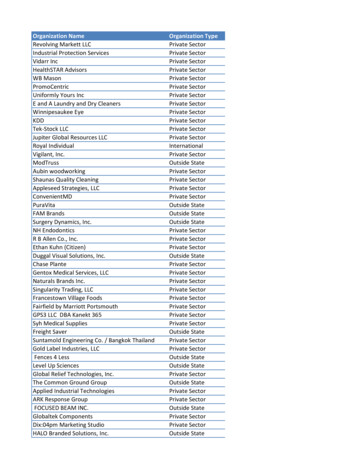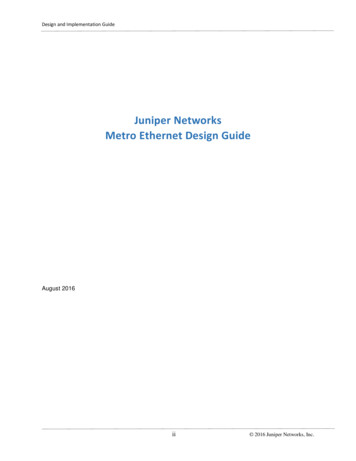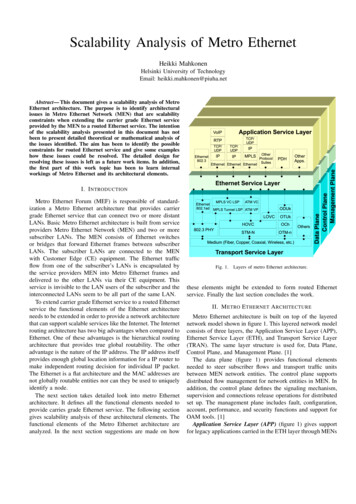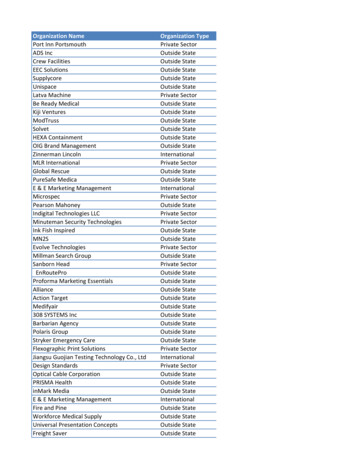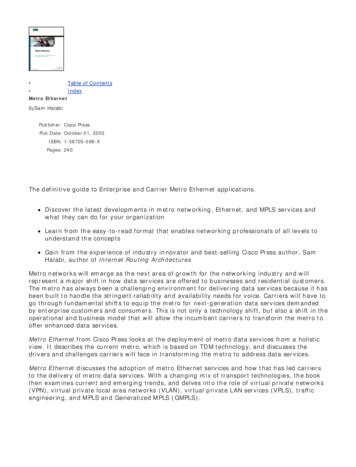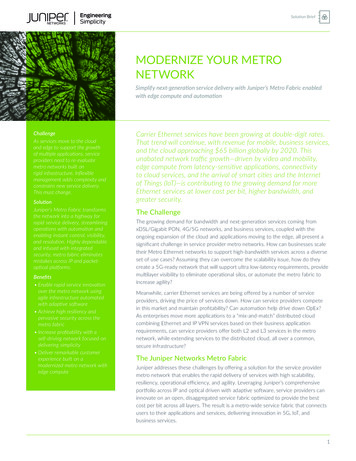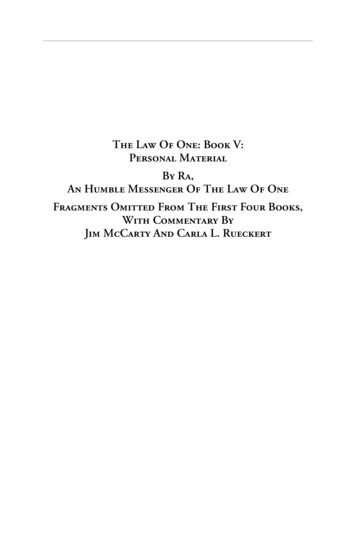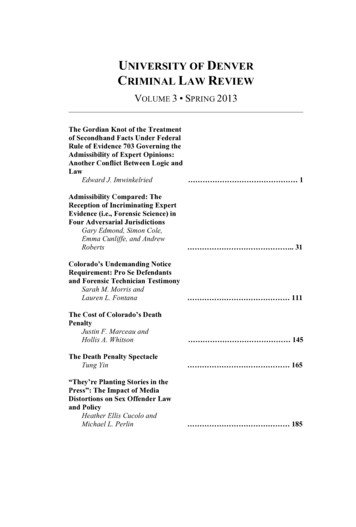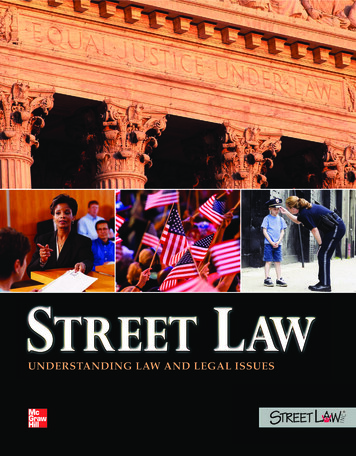
Transcription
NOVEMBER 2021ntonrreaWLaw & LifeOutside theMetro AreasLawyers from Eastern,Central, Southern andCoastal Oregon ShareTheir Perspectives
OREGON STATE BAR BULLETINNOVEMBER 2021VOLUME 82 NUMBER 2OSB Staff - Sunny ChaoThe second in our occasional Conversationsseries, this time we explore practicing law andenjoying life outside the Portland/Salem/Eugenemetro areas. Lawyers from around the stateprovide their individual experiences in regard toaccess-to-justice, a sense of community, diversityissues and why they love their unique Oregonsurroundings.FEATURES16Law & Life Outside the Metro AreasLawyers from Eastern, Central, Southern and Coastal OregonShare Their PerspectivesBy Michael Austin24A Sense of BelongingAttorneys Address Impacts of Imposter Syndrome,Solutions to Combat ItBy Melody FinnemoreCOLUMNS9Bar CounselStrictly Confidential:Do Not Treat ‘Privileged’and ‘Confidential’Interchangeably32By Mick Harris and LindsayWillsonBy Daniel P. Atkinson13The Legal WriterSCOTUS (cleaned up):Should Oregon AttorneysClean Up Quotations?36By Katrina Robinson andSuzanne Rowe28The Oregon State Bar Bulletin (ISSN 0030-4816)is the official publication of the Oregon State Bar.The Bulletin is published 10 times a year (monthlyexcept bimonthly in February/March and August/September) by the Oregon State Bar, 16037 S.W.Upper Boones Ferry Road, Tigard, OR 97224. TheBulletin is mailed to all members of the Oregon StateBar, a portion of the dues for which is allocatedfor the purpose of a subscription. The Bulletin isalso available by subscription to others for 50 peryear, 90 per two years, within the United States.Individual copies are 5; back issues are 5 each,when available. Periodicals postage paid at Portland,Oregon 97208. POSTMASTER: Send addresschanges to Oregon State Bar, P.O. Box 231935,Tigard, OR 97281-1935.Profiles in the LawA Long, Strange Trip:Oregon Lawyer andActivist Leland BergerChallenges Drug LawsLegal Practice TipsChanging with theClimate: EnvironmentalConcerns to AffectPublic-Company DisclosuresLawyer Well-BeingImprove CognitiveFunctioning: Gaining aProfessional Edge bySeeking HelpBy Laura Mahr40By Janay HaasLaw and LifeNavigating Norway: ALesson in Maritime Law& a Look at an OverseasCareerBy Kim JefferiesDEPARTMENTS5Letters7Briefs46OSB Education & Research48Bar News50Bar ActionsDiscipline52Bar PeopleAmong Ourselves54Classifieds58Attorneys’ Marketplace62Photo Finish
Oregon lawyerssupportingcivil legal aid programsstatewide.www.cej-oregon.org
LETTERShung up, Jim said to me, “Ed, I love you.” Iimmediately replied, “Jim, I love you, too.”This exchange, short as it was, symbolizes the affection that my law school classhad for each other. Only five of us are leftout of 21 graduates. I hope the Bulletin willpublish this letter to commemorate the lovethat we class members felt and still feel forone another.The Legislature and the bar should address themselves to changing the reservationsystem. Subjecting the reservation and nonreservation public to possibly unconstitutional orders and judgments is not the way.— Edwin J. Peterson, SalemThank you for featuring this landmarkbill in the August/September issue of theBulletin. SB 183 will extend the state’s fullfaith and credit to tribal court judgmentsand strengthen enforcement by non-tribalentities. The superb article by Janay Haasdescribes gaps in the current law and resulting negative consequences, as articulated bytribal court judges and others. The lack of enforcement is particularly onerous for womenand children. SB 183 specifically targetsweaknesses in current law, and I am confident that with unanimous passage by theLegislature, strong advocacy and support byChief Justice Walters, and follow-up training for relevant local and state personnel, thenew law will serve its intended purposes.Thanks also to the state bar and ChiefJustice Walters for recognizing the effortsof all involved in crafting the legislation andadvocating for its passage, particularly theHon. William Johnson, chief judge of theUmatilla Tribal Court. (See October issueof the Bulletin.)For those interested in early efforts to defend tribal self-determination, I would like torecommend Louise Eldrich’s Pulitzer Prizewinning novel The Night Watchman. Foryouthful inspiration on the issue of MMIW(Missing and Murdered Indigenous Women), please read the profile of athlete andactivist Rosalie Fish (Cowlitz Tribe, Muckleshoot heritage) in the fall edition of the University of Washington magazine (“For theMissing and Murdered”) by Luna Reyna. niStock.com/marchmeena29Disagrees with Full Faith and CreditTo Tribal Court OrdersLove for Classmates,Not the New PolicyJames Cox and I were classmates at theUniversity of Oregon, graduating in 1951.We met as freshmen. We were members ofthe Skull and Dagger honorary for sophomore men. And, we were University of Oregon Law School classmates over the sameyears, culminating in 1957.After our 50th anniversary as lawyers, thebar contacted us and said that two types ofmembership were available. One was “Inactive,” requiring small dues or fees; the otherwas “Retired,” requiring no fees whatsoever.In the past week, Jim and I talked byphone. He was objecting to the new ruleseliminating fee waivers for over-50-year retired members. He thought — and I agreed— that after 50 years, we damn well oughtto have free membership. But, of course,that was not to be. It seems Jim had optedfor one category and I had opted for another. One thing we agree upon — we don’tlike the new policy!But the real significance of my conversation with Jim Cox was this: Just before weThe “Strengthening Tribal Justice” article (August/September 2021 Bulletin) discusses a new and unique Oregon law thataffords constitutional full faith and creditto all tribal court orders. The full faith andcredit clause applies to states and plainlydoes not apply to tribal courts. The intention of this clause was that full faith wouldnot be applied to territories, outlying regions and possible United States affiliates,because only states could be relied uponto produce orders that complied with theConstitution, as, for example, orders coming from jurisdictions with three separatebranches. How did the Oregon Legislaturedecide that tribes are actually states? I suspect that few, if any, tribal courts can establish that they comply with the institutionaland constitutional requirements of a courtand the requirements for due process, noris there any mechanism for demonstratingwhether they comply or not.Most reservations suffer from high unemployment, high rates of substance abuse,high rates of crime and perhaps high rates ofdespair. It is this which the bar associationshould be concerned. Bolstering the authorityof tribal courts will not solve these problems.Some argue that the tribes are nations.The tribes are not nations. A nation must havetaxes, borders, relations with foreign countries, coinage and freedom from Congress.— Roger B. Ley, PortlandHappy for Passage of SB 183,Thanks Those Involved— Karen Sjogren, SalemHOW TO REACH US: Call (800) 452-8260, or in the Portland area call (503) 620-0222. Email addresses and voicemail extension numbers for Bulletin staff are:Michael Austin, editor, maustin@osbar.org (ext. 340); Kateri Walsh, communications director, kwalsh@osbar.org (ext. 406); and Spencer Glantz, classified adrates and details, advertising@osbar.org (ext. 356), fax: (503) 684-1366. Display advertising and Lawyer Announcements: Contact LLM Publications at (503)445-2240, law@llmpubs.com.NOVEMBER 2021 OREGON STATE BAR BULLETIN5
BRIEFSThis move grows BB&K’s total numberof offices to 11.Queen’s Bench Holiday LuncheonSet for Dec. 14iStock.com/smolaw11Queen’s Bench, the Multnomah County Chapter of Oregon Women Lawyers, ishosting its 32nd annual holiday luncheonhonoring women judges on Dec. 14. Therewill be a “best dressed” contest, touchingstories from speakers, the chance to reminisce about the past year in breakout roomsand the opportunity to dream together fora better future. Tickets will be available inlate November at www.owlsqueensbench.org/.Nominations Open to Awardthe Next Legal VisionaryHon. Suzanne Chanti toReceive Chief Justice MarthaWalters AwardHon. Suzanne Chanti will be recognized with the 3rd Annual Chief JusticeMartha Walters Award presented by LaneCounty Women Lawyers/OWLS. Theaward recognizes a Lane County attorneywho has demonstrated leadership in thepursuit of equal justice for all. The celebration will be held at The Gordon Hotel inEugene on Friday, Dec. 10, from 12-1 p.m.Attendees will be required to show proofof a valid COVID-19 vaccination and facemasks will be required when not eating ordrinking. To purchase 35 tickets for theluncheon and for additional information,visit https://tinyurl.com/haxewwyd.Karnopp Petersen MergingWith Best Best & KriegerKarnopp Petersen based in Bend ismerging with Best Best & Krieger. Themerger is set to go into effect Jan. 1, 2022.Karnopp Petersen has served clients acrosscentral Oregon since 1935 with experiencein environmental, energy, health care, trustsand estates, real estate, business and community association matters. With the combination, BB&K will retain Karnopp Petersen’s existing Bend office of 15 attorneys.The Institute for the Advancement ofthe American Legal System (IAALS) hasopened the nomination window for the2022 Alli Gerkman Legal Visionary Award,which recognizes innovators who havemade significant impacts early in their legal careers toward making the Americanlegal system work better for everyone. Theaward is designed to encourage and showcase innovators, risk takers, visionaries andemerging leaders who bring a different perspective and a reform-minded approach tothe improvement of our legal system. Candidates should be early in their legal careersto be eligible, roughly the first 15 years.Nominations for the Alli Gerkman Legal Visionary Award are accepted throughDec. 1. IAALS then reviews the nominations and selects the recipient. The winnerwill be presented at the Rebuilding JusticeAward Dinner in April. To make a nomination, visit letin Named FinalistFor 2 NABE AwardsThe Oregon State Bar Bulletin recentlywas named a finalist for two National Association of Bar Executives CommunicationsSection Luminary Awards. The Bulletinearned high marks in the Regular Publication category for overall content, designand presentation, as well as in the AuthoredArticle category for the June 2021 coverstory, “Demands Drive Women to theBrink.” Accepting submissions digitally forthe first time, the NABE CommunicationsSection recognized the finalists stood outamong a crowded field of entrants.Nominations Needed for District ofOregon Civil Local Rules CommitteeThe U.S. District Court for the Districtof Oregon seeks nominations for its CivilLocal Rules Committee. The committee'snarrow mission is to ensure conformitybetween the district’s local rules and theFederal Rules of Civil Procedure. The committee convenes only as needed to recommend amendments to the local rules in lightBy the NumbersCOVID Affects RetirementSome senior lawyers are changingtheir retirement plans due to theCOVID-19 pandemic. The AmericanBar Association’s Profile of the LegalProfession Report for 2021 showslawyers inching closer to retirementage are adjusting their future professional plans.To the question, “Has the pandemicaffected your retirement timeline?”senior lawyers (those 62 years of ageand older), responded in the following manner:Yes 33%No 51%Other 16%For those who answered “Yes,” 53%said they delayed retirement while47% said they accelerated retirement plans. Additionally, 36% of allsenior lawyers reported making lessmoney during the pandemic with47% reporting they brought homethe same income.NOVEMBER 2021 OREGON STATE BAR BULLETIN7
Quotable“Historically, LGBTQ people have been discriminated againstusing laws, so being able to help those students go throughlaw school and learn how to change the law in their favor isimportant to me.”— Megan Hinzdel, on why she’s been a mentor to LGBTQ law studentsthrough the Willamette Law Attorney-Mentor Program, which celebratedits 30th anniversary last year. Willamette University, “Attorney MentorProgram Turns 30,” Oct. 13, 2021.November 2021Editor Michael AustinPublisher Anna ZanolliArt Director Sunny ChaoOSB PresidentDavid Wade, EugeneOSB President-ElectKamron Graham, PortlandOSB Immediate Past PresidentLiani JH Reeves, Portlandof changes to the federal rules. Committeemembers typically serve four-year terms.Those selected pursuant to this call fornominations start their terms in spring of2022. Individuals nominated must be lawyers admitted to practice in the District ofOregon who regularly practice in federalcourt. The court seeks a committee thatconstitutes a fair cross-section of practitioners in the district and will consider diversity of all kinds, including practice area andgeography, when selecting members.At least three vacancies are anticipated.To ecnourage district-wide representation,applications from outside the Portland areaare especially welcome.To nominate yourself or someone else,send one or two paragraphs describing thenominee’s qualifications. Nominations aredue on or before Dec. 31, 2021. Send nominations by email to Melissa Aubin@ord.uscourts.gov. nBoard of GovernorsColin Andries, PortlandChristopher Cauble, Grants PassGabriel Chase, PortlandJenny Cooke, PortlandKatherine Denning, SalemLee Ann Donaldson, PortlandJohn E. Grant III, PortlandBik-Na Han, HillsboroJoseph Hesbrook, BendRyan Hunt, SalemMatthew McKean, HillsboroRob Milesnick, Vancouver, Wash.Curtis Peterson, PortlandJoe Piucci, PortlandMichael Rondeau, RoseburgDavid Rosen, BendTasha Winkler, PortlandEditorial Advisory CommitteeLisa Marie Christon, EugeneKatherine Denning, SalemSteven M. Gassert, PortlandAurora B. Levinson, PortlandPete Meyers, PortlandChristine Moses, Lake OswegoJudith A. Parker, PortlandKyra Kay Rohner, Baker CityElizabeth A. Rosso, Lake OswegoChief Executive OfficerHelen HierschbielCommunications DirectorKateri WalshCopyright 2021 the Oregon State Bar.All rights reserved. Requests to reprintmaterials must be in writing.8OREGON STATE BAR BULLETIN NOVEMBER 2021
BAR COUNSELDo Not Treat ‘Privileged’ and ‘Confidential’ InterchangeablyBulletin File PhotoStrictly ConfidentialDaniel P. AtkinsonAsone of three lawyers in thebar’s Client Assistance Office,I review many inquiries aboutlawyer conduct initiated by the client.1 If Ifind that the client’s concerns raise any possible issues under our Rules of ProfessionalConduct (RPC), I will write to the lawyerrequesting a response addressing the issuesI’ve flagged.When responding, lawyers often askme to clarify whether the client has waivedattorney-client privilege by contacting thebar. This is a great question, but it’s just thestarting point.Know Your DutyNow that I have your attention, let’sliven things up by turning to the dictionary. We already have one term on ourhands: privileged. Let me introduce another: confidential. This column examineswhy we need to avoid the habit of treatingthese two terms interchangeably when ourBy Daniel P. Atkinsonsafekeeping of client information is concerned. These terms get tangled. Startingwith the basics may help loosen the tangle,so let’s hear from the dictionary:Privileged is defined as “having specialrights, advantages, or immunities.”Confidential is defined as “entrustedwith private or restricted information.”Note the contrast here between something for which one is simply entitled vs.something one has been given because theyare trustworthy. The British queen enjoyscertain privileges. James Bond might, as heragent, gain confidential information. Guesswho is who in this analogy? A client’s information is privileged; as their lawyer wekeep it confidential. We certainly shouldtake care to advise the client and take othermeasures to protect and preserve the client’s privilege. But in considering our ownconduct, we ought to focus on our duty tomaintain client confidentiality as well.This contrast is underscored when oneremembers that the attorney-client privilege is a rule of evidence.2 In simplest terms,this rule protects from disclosure any confidential communications, primarily betweenthe client and their lawyer, in furtherance ofthe rendering of legal services. To attemptto define it more completely is beyond thescope of this or any column.3We should always take care to honorand protect the client’s privilege. However,the distinction between what is privilegedand what is confidential is important fortwo reasons. First, our duty of confidentiality extends beyond information that may beprivileged. Second, the same standard applies to what information we may reveal ininstances where the client has waived theirprivilege.So, asking about waiver of privilege isnot enough. The question might be recastas follows: What information relating to therepresentation of a client may I reveal whenresponding to the bar’s inquiry about myrepresentation of the client?The answer is in RPC 1.6: You may reveal information relating to the representation of a client to the extent you reasonablybelieve necessary to respond to the client’sallegations in CAO’s inquiry concerning yourrepresentation of the client. RPC 1.6(b)(4).Simple, right? Well, hold on. As noted,there are two key points to keep in mind.First, the rule refers broadly to “informationrelating to the representation of a client,”not just privileged information. Second, determining what information we believe it isreasonably necessary to reveal is a difficultexercise calling for our best professionaljudgment. We’ll work through these twopoints, beginning with the second, to lookat recent court guidance.What May We Reveal?I want to call attention to a recent Oregon Supreme Court addressing what information you are permitted to reveal if andwhen circumstances allow disclosure.4 Inthe July 2021 opinion In re Conry, the courtfound that a lawyer had committed misconduct by revealing more than was reasonably necessary when responding to severalnegative reviews posted online by a formerclient.5 The lawyer had revealed the formerclient’s criminal histories, including convictions.6The “reasonably necessary” standardis provided by RPC 1.6(b), which lists circumstances where a lawyer is permitted toreveal confidential information. Highlightsinclude reporting your client’s intent tocommit a crime and giving information necessary to prevent it, (b)(1); seeking to prevent reasonably certain death or substantialbodily injury, (b)(2); getting legal adviceabout one’s conduct under the RPCs, (b)(3); and complying with other law or courtorder, (b)(5). As cited above, RPC 1.6(b)NOVEMBER 2021 OREGON STATE BAR BULLETIN9
OSB News and EventsCheck the Oregon State Bar website for updateson rule changes, judicial vacancies, upcomingevents and more: www.osbar.org(4) is what might be called the self-defenseexception, providing, among other circumstances, that we may reveal information torespond to allegations in any proceedingconcerning our representation of the client.When you find yourself in one of thesecircumstances, remember two things. First,this is permission to disclose confidentialinformation, not an obligation. This is notanother mandatory reporting duty. It is, instead, a set of circumstances where a lawyermay reveal confidential information without violating RPC 1.6.Second, as Conry shows, mind the reasonably necessary standard when a disclosure is permitted. RPC 1.6 is prescriptive,not proscriptive. Many laws and rules areproscriptive. They establish what you cannot do. Anything not listed is permitted.Criminal codes are an obvious example.But other laws and rules are prescriptive.They establish what you can do. Anythingnot listed is prohibited. Zoning codes workthis way. So, too, does RPC 1.6. If you exceed what RPC 1.6 permits, it is a violation.Information Beyond PrivilegeNow let’s go back to the first point: Theduty of confidentiality applies to more information than the privilege. Let’s look atthe rule. RPC 1.6(a) provides:“A lawyer shall not reveal information relating to the representation of aclient unless the client gives informedconsent, the disclosure is impliedlyauthorized in order to carry out therepresentation or the disclosure ispermitted by paragraph (b)”As we’ve seen, I like to look at definitions. RPC 1.0(f) defines “Information relating to the representation of a client” asfollows:“ both information protected by theattorney-client privilege under applicable law, and other informationgained in a current or former professional relationship that the client hasrequested be held inviolate or thedisclosure of which would be embarrassing or would be likely to be detrimental to the client.”The duty of confidentiality, then, includes information protected by the attorney-client privilege. But it doesn’t endthere. We have the same duty with respectto considerable other information, no matter the source: secrets, embarrassmentsand the detrimental. Under RPC 1.6, such10OREGON STATE BAR BULLETIN NOVEMBER 2021
information has equal footing withinformation covered by the privilege.RPC 1.6 casts a wide net. A sense ofits scope may be provided by consideringits application to information of public record. It might seem, at first blush, that theduty of confidentiality could not possiblyextend to such information. If the horse isgone, no sense shutting the barn door. Thisseems reasonable, but look again. This lineof thinking is borrowed from the law of attorney-client privilege. Applied in that context it makes sense: matters of public recordcan’t possibly be privileged. But they maybe confidential. We need to keep those twoconcepts untangled.ABA Formal Opinion 479 addresses thistopic and the “generally known” exceptionin Model Rule 1.9(c). As explained there,information is not “generally known” simply because it is publicly available somewhere, such as court or other governmentrecords, archives or libraries. Moreover, theopinion is at pains to make clear that thisexception only permits a lawyer to use, notto reveal or disclose, former client information that has become generally known.As an example, a former firm of mineconsidered representing the wife in apending divorce. Several years previously, we had represented the husband ina land use application. The land in question was likely part of the marital estate.Consequently, we had to determine whatinformation we had gained during thatprior representation and if we would bebarred from using it to the husband’s detriment by RPC 1.9(c)(1). We also had todetermine whether there was a substantialrisk that we had information a competentlawyer would have gained from the priorrepresentation that would materially advance the wife’s position if we agreed torepresent her. RPC 1.9(d). If so, we couldonly represent the wife if both she and theformer client husband gave informed consent, confirmed in writing. RPC 1.9(a).It would not be enough to say that theproceedings in the land use applicationwere public record. One would need to goto the county planning office and specifically identify the matter to have any hopeof convincing a planner to retrieve the file.It is fair to say that but for representing thehusband in the matter, we would not knowto look for it; indeed, we would not knowthe information existed. Such informationis public, but confidential.NOVEMBER 2021 OREGON STATE BAR BULLETIN11
PROOF 11-2-21LAW Fishleder Annct OSB QB40821/6: 4.9375” x 2.375”So, when we fall into the habit oftreating privilege and confidentiality interchangeably, we risk failing to identify allof the information we are obliged to keepconfidential. As a parting example, say anelderly client is escorted to an appointmentby his daughter. He wishes for her to sit in,but you rightly insist on meeting with yourclient alone so that what you discuss is privileged. Afterward, in casual conversation,his daughter tells you something embarrassing about him. Whatever distinction a courtmight draw under the rules of evidence, foryou the same duty of confidentiality applies whether information is privileged orembarrassing.It has been a privilege to run throughthese issues a bit, and it is my hope thatwith the relevant concepts and distinctionswell in hand, you may proceed with confidence in determining how best to safeguardall of the information gained in the courseof representing a client. As always, we areavailable for your questions at the EthicsHelpline at (503) 431-6475.7 nENDNOTES1. If you don’t know us, CAO is responsible forinitial screening of all inquiries about lawyerconduct in Oregon. We determine whichamong them raise a sufficient possibility oflawyer misconduct to warrant further scrutiny by Disciplinary Counsel.2. ORS 40.225 Rule 503.3. Not long ago, a federal judge in Pennsylvania set forth 13 separate hypothetical scenarios, stating his view regarding each one,in an effort to help the parties properly applythe attorney-client privilege to in-housecounsel communications in discovery. See 34Law. Man. Prof. Conduct 114 (2018).4. In re Conry, 368 Or 349 (2021).5. If you missed it, my colleague Linn Davis’scolumn discussing how to address negativeonline reviews is well worth a look. “Reputation Management: Responding to NegativeOnline Reviews,” by Linn D. Davis. OregonState Bar Bulletin, July 2017.6. Yes, criminal convictions are public information; nevertheless, the court ruled that thedisclosure was unreasonable and unnecessary.7. Given the topic, it bears noting that thehypothetical guidance we offer at the EthicsHelpline is not legal advice permitting disclosure of confidences under RPC 1.6(b)(3).12OREGON STATE BAR BULLETIN NOVEMBER 2021
THE LEGAL WRITERShould Oregon Attorneys Clean Up Quotations?By Katrina Robinson and Suzanne RoweBulletin File PhotoSCOTUS (cleaned up)Suzanne E. RoweKatrina Robinsonnew citation parenthetical is making its way into opinions and briefs:(cleaned up). It allows writers toquote a quotation without pesky indications of altered words, omitted punctuation or deleted citations. At the end of thecitation following a quotation that has beenaltered from the original, the writer simplyadds (cleaned up), and poof! All responsibility for precision and accuracy disappears.what changes the writer made. And because(cleaned up) might clear out important nuances, we conclude that it presents toogreat a risk to the accuracy of legal writing.Let’s look at the origin of (cleaned up),delve into what it actually does and consider the possibilities for its future. Then,you can reach your own conclusion aboutcleaning up quotations.ASome legal readers celebrate the newparenthetical for the ease it brings to reading text without brackets, ellipses and layers of quotation marks. Others are wary ofcompromises to the integrity of quoting.Of course, some are still living blissfully unaware of the new approach.1We don’t mean to stand in the wayof progress, but like the second group ofreaders, we are wary about this new approach. Specifically, we are concerned that(cleaned up) puts the onus on the reader tofind the original source and determine justFrom Twitter to SCOTUSOn March 15, 2017, Jack Metzler, anappellate attorney with the Federal TradeCommission tweeted, “I propose a new parenthetical for quotes that delete all messyquotation marks, brackets, ellipses, etc.:(cleaned up).” A week after his tweet, Metzler posted an article on SSRN expoundingon his proposal; a peer-edited law journallater published the article.2 He argued thatthe traditional rules governing quotations“fail to convey meaningful informationbeyond the first level of quotation”3 and“add visual clutter without providing anyinformation that helps the reader evaluatethe quotation.”4Following his proposal, a quotation of aquotation could do any and all of the following: (1) omit non-substantive material likebrackets, ellipses, quotation marks, footnote call numbers and internal citations;(2) change the case of a letter without placing brackets around the changed letter; and(3) omit references to an intermediate decision in a string of three or more decisions.Over the next few years, the proposalto clean up the visual clutter of quotationsbecame popular with some attorneys andjudges. Then, in May 2021, (cleaned up)first appeared in a Supreme Court decision,Brownback v. King,5 as the Court explainedres judicata in the context of the FederalTort Claims Act. The following excerpt isexactly what appears in the opinion:Under that doctrine as it existed in1946, a judgment is “on the merits”if the underlying decision “actuallypasses directly on the substance of aparticular claim before the court.” Id.at 501–02 (cleaned up).That seems rather innocuous. But whatexactly got cleaned up?Cleaning UpTo see how (cleaned up) works in practice, let’s work through the quotation fromBrownback. In that opinion, Justice ClarenceThomas sought to define what it means fora judgment to be “on the merits.” He quoted a passage from a prior Supreme Courtdecision by Justice Antonin Scalia and, inthat passage, Justice Scalia had quoted theRestatement of Judgments, which explainsthe distinction between a judgment on themerits and other judgments. Here is the unaltered text of the paragraph in question:It is frequently said that a valid andfinal personal judgment for the defendant will bar another action onNOVEMBER 2021 OREGON STATE BAR BULLETIN13
the same claim only if the judgmentis rendered “on the merits.” The prototype case continues to be one inwhich the merits of the claim are infact adjudicated against the plaintiffafter trial of the substantive issues. Increasingly, however, by statute, rule,or court decision, judgments notpassing directly on the substance ofthe claim have come to operate as abar. Although such judgments are often described as “on the merits” or as“operating as an adjudica
issues and why they love their unique Oregon surroundings. COLUMNS FEATURES The Oregon State Bar Bulletin (ISSN 0030-4816) is the official publication of the Oregon State Bar. The Bulletin is published 10 times a year (monthly except bimonthly in February/March a
